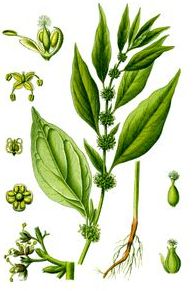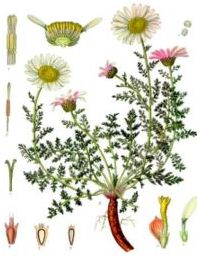|

Pellitory |
A plant belonging to the order of Nettles, the Pellitory of the Wall, or Paritory Parietaria, from the Latin parietes, walls--is a favorite Herbal Simple in many rural districts. It grows commonly on dry walls, and is in flower all the summer. The leaves are narrow, hairy, and reddish; the stems are brittle, and the small blossoms hairy, in clusters. Their filaments are so elastic that if touched before the flower has expanded, they suddenly spring from their in
curved position, and scatter the pollen broadcast.
An infusion of the plant is a popular medicine to stimulate the kidneys, and promote a large flow of watery urine. The juice of the herb acts in the same way when made into a thin syrup with sugar, and given in doses of two tablespoonfuls three times in the day. Dropsical effusions caused by an obstructed liver, or by a weak dilated heart, may be thus carried off with marked relief. The decoction of "Parietaria", says Gerard, "helpeth such as are troubled with an old cough."
All parts of the plant contain nitre abundantly. The leaves may be usefully applied as poultices. |
But another Pellitory, which is more widely used because of its pungent efficacy in relieving toothache, and in provoking a free flow of saliva, is a distinct plant, the "Pyrethrum", or Spanish Chamomile of the shops, and not a native of Great Britain, though sometimes cultivated in our gardens. The title "Purethron" is from pur, fire, because of its burning ardent taste. Its root is scentless, but when chewed causes a pricking sensation (with heat, and some numbness)
in the mouth and tongue. Then an abundant flow of saliva, and of mucus within the cheeks quickly ensues. These effects are due to "pyrethrin" contained in the plant, which is an acid fixed resin; also there are present a second resin, and a yellow, acrid oil, whilst the root contains inulin, tannin, and other substances. When sliced and applied to the skin it induces heat, tingling, and redness. A patient seeking relief from rheumatic or neuralgic affections of the head and
face, or for palsy of the tongue, should chew the root of this "Pyrethrum" for several minutes.
|

Pyrethrum |
The "Pelleter of Spain" (Pyrethrum Anacyclus), was so styled, not because of being brought from Spain; but because it is grown there.
A gargle of "Pyrethrum" infusion is prescribed for relaxed uvula, and for a partial paralysis of the tongue and lips. The tincture made from the dried root may be most helpfully applied on cotton wool to the interior of a decayed tooth which is aching, or the milder tincture of the wall Pellitory may be employed for the same purpose. To make a gargle, two or three teaspoonfuls of the tincture of "Pyrethrum", which can be had
from any druggist, should be mixed with a pint of cold water, and sweetened with honey, if desired. The powdered root forms a good snuff to cure chronic catarrh of the head and nostrils, and to clear the brain by exciting a free flow of nasal mucus and tears--Purgatur cerebrum mansadice Pyrethri.
Incidentally, as a quaint but effective remedy for carious toothache, may be |
mentioned the common lady bird insect, Coccinella, which when captured secretes from its legs a yellow acrid fluid having a disagreeable odour. This fluid will serve to ease the most violent toothache, if the creature be placed alive in the cavity of the hollow tooth.
Gerard says this "Pyrethrurn" (Pellitory of Spain, or Pelletor) "is most singular for the surgeons of the hospitals to put into their unctions contra Neapolitanum morbum, and such other diseases that are cousin germanes thereunto." The "Parietaria", or Pellitory of the wall, is named Lichwort, from growing on stones.
Sir William Roberts, of Manchester, has advised jujubes, made of gum arabic and pyrethrum, to be slowly masticated by persons who suffer from acid fermentation in the stomach, a copious flow of alkaline saliva being stimulated thereby in the mouth, which is repeatedly swallowed during the sucking of one or more of the jujubes, and which serves to neutralize the acid generated within the stomach. Distressing heartburn is thus effectively relieved without taking injurious
alkalis, such as potash and soda.
Herb Simples
The Primitive Simplers presented here show the way of life in other generations, it is not suggested or recommended trying them yourself. |
|
Garden
Herbs
Home
History of Herbs
Herb Gardening
Herbs for Beginners
Drying & Preserving Herbs
Indoor Herb Gardening
Herb Garden
Hints & Tips
Herbal
Cooking
Herb Chart
Using Herbs
Culinary Herbs
Herb
Oil and Vinegar
Herb Teas
Herb Candy
Herb Jelly
Herb Simples
Preface
Introduction
Alphabetical Listing

Trade
Recipes Online
Share your Recipes with others!!
|



